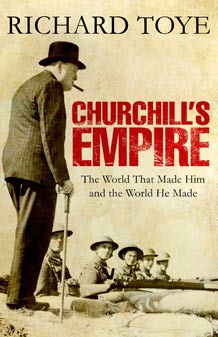
Book cover: ‘Churchill’s Empire – The World That Made Him and the World He Made’
Churchill’s Empire revealed in new biography
The first comprehensive account of Churchill’s lifelong involvement with Empire, from his childhood schooldays to his emergence as self-made imperial hero to his final premiership in the 1950s, has been written by a University of Exeter historian.
Professor Richard Toye’s new book ‘Churchill’s Empire – The World That Made Him and the World He Made’ places Churchill in the context of his times and his contemporaries. It evaluates his position on key imperial questions and offers insight into what was conventional about Churchill’s opinions and what was unique.
In 1942 Churchill spoke these notorious words, ‘I have not become the King’s First Minister in order to preside over the liquidation of the British Empire.’ The book shows that such words encapsulated his image as an imperial die-hard, implacably opposed to colonial freedom, a reputation that has prevailed, and which Churchill willing embraced to further his polices. However, as Professor Toye now shows, his relationship to Empire was far more complex and ambiguous.
Professor Toye said, ‘To the modern reader, it will be surprising to discover that Churchill’s former headmaster at Harrow School, the Rev. J.E.C. Welldon once described his actions as ‘unpatriotic’. The comments were made in a letter to another former pupil, after reading Churchill’s First World War memoirs, The World Crisis.
He adds: ‘Of course, it seems ludicrous today that anyone should have suggested Churchill was in any way unpatriotic. But these comments do show that the modern image of him is at odds with that which prevailed during much of his life.’
Although thought of today as a die-hard imperialist, Professor Toye demonstrates how as a young politician, Churchill was criticised for his supposedly left-wing views. In May 1906, Lady Lugard reported to her husband, who was High Commissioner of Northern Nigeria that Churchill had talked ‘rank little Englandism’ and had also spoken to ‘extreme radical rubbish about holding innocent peoples tight in the grip of a military despotism.’ (‘Little Englandism’ implied opposition to imperial expansion and was often used as a term of abuse.)
Ramsay MacDonald, the future Labour Prime Minister, accused Churchill of excess zeal in his efforts to exert control over local colonial governments’ treatment of their non-white populations. ‘I do not think I am an over-cautious man, or that my sympathies with oppressed black and yellow men in South Africa are niggardly’, MacDonald wrote. ‘But I am bound to say that, unless the Cabinet muzzle Mr. Winston Churchill, they will bring themselves into a disastrous conflict with the Colonies.’
Churchill’s Empire argues that in subsequent years Churchill deliberately cultivated the die-hard image which remains today. The book shows how, during the second half of his career, that image came to crowd out the earlier picture in which he appeared as a conciliatory figure and even as a danger to the Empire.
Date: 18 February 2010
